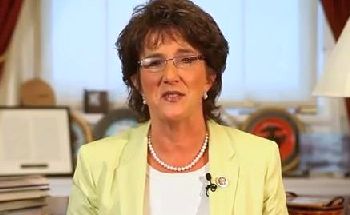 05/02/13 As the only member of the House Veterans’ Affairs Committee, Congresswoman Jackie Walorski (IN-02) led a letter to the Department of Veterans Affairs (VA) supported by bipartisan members of Indiana’s delegation. The letter asks Secretary Shinseki to explain how the new tax will impact access to quality care for veterans who rely on medical devices.
05/02/13 As the only member of the House Veterans’ Affairs Committee, Congresswoman Jackie Walorski (IN-02) led a letter to the Department of Veterans Affairs (VA) supported by bipartisan members of Indiana’s delegation. The letter asks Secretary Shinseki to explain how the new tax will impact access to quality care for veterans who rely on medical devices.
“Wounded warriors in Indiana and across the country are undoubtedly concerned with how the medical device tax will affect their care and access to critical medical devices. As their representatives, we are greatly concerned and have questions that need to be addressed,” said the Representatives.
The VA released a report confirming the department will likely see a cost increase for prosthetics and other medical devices as a result of the tax. Last week, Congresswoman Walorski questioned VA officials during a hearing to request more information explaining the implications of the medical device tax on the veterans’ community—stressing the importance of providing those who have served with quality medical care. The letter outlines a list of specific questions, including confirmation that veterans will not be deferred from quality care due to cost issues. The delegation respectfully requested a formal response from the VA within 30 days.
Congresswoman Walorski’s letter was also signed by Congresswoman Susan Brooks, Congressmen Larry Bucshon, André Carson, Luke Messer, Todd Rokita, Marlin Stutzman, and Todd Young.
TEXT OF LETTER TO SECRETARY SHINSEKI:
May 1, 2013
The Honorable Eric K. Shinseki
Secretary of Veterans Affairs
The Department of Veterans Affairs
810 Vermont Avenue, NW
Washington, DC 20420
Dear Secretary Shinseki:
We write to express our concern regarding the recent implementation of the medical device excise tax, and the implications it will have for the Department of Veterans Affairs (VA). As you know, on January 1, 2013, a 2.3 percent excise tax was imposed on the sale of medical devices by manufacturers, producers, and importers in accordance with the Health Care and Education Reconciliation Act of 2010 (P.L. 111-152).
Section 9011 of the Patient Protection and Affordable Care Act (P.L. 111-148, PPACA) requires you to submit a report to Congress on the effect the medical device excise tax will have on the cost of medical care provided to veterans as well as veterans’ access to medical devices. This report states the “VA anticipates a 2.3 percent increase in costs to offset the negatively impacted profit margin for the vendors/manufacturers that will be paying the tax. This is based on commentary and published opinions that vendors will pass this additional cost on to all consumers, including the VA.” This anticipated increase in cost has overwhelmingly been confirmed by medical device manufacturers in the state of Indiana. We have also heard from medical device vendors who will be forced to reassess the products they provide.
In its January 2013 newsletter, the VA Federal Supply Schedule Service (FSS) highlighted how schedule contractors providing effected medical devices will be able to submit a price increase modification request. While we are encouraged by this VA action to ensure veterans continue to have access to the highest quality medical devices in the near future, we are concerned with the VA’s plan to fulfill its commitment to provide veterans with medical devices over the long-term, as medical device manufacturers and vendors continue to pay the excise tax.
Wounded warriors in Indiana and across the country are undoubtedly concerned with how the medical device tax will affect their care and access to critical medical devices. As their representatives, we are greatly concerned and have questions that need to be addressed.
• In the report referenced earlier, it states “veterans’ access to medical devices will not be an issue in fiscal year 2013 given the current budget.” Can you please provide us with a projection on how this tax will impact the amount of money VA spends on medical devices in FY14 and FY15? How does the VA plan to absorb these additional costs?
• Once again, we bring your attention to the report which says the “impact on access in future years is contingent on the sustained adequacy of VA’s budget to provide medical devices to meet Veterans’ needs.” Does the VA have a contingency plan in place to address the quality and accessibility of medical devices should costs continue to rise?
• What specific steps will you take to ensure no veteran will go without or have to sacrifice quality as a result of increased medical device costs?
We are proud that almost 480,000 veterans call Indiana home. We are committed to fulfilling our promises to these veterans to ensure they receive the benefits they have earned as well as any medical device they may need as a result of their service. Thank you for your service and commitment to our nation’s veterans. We respectfully ask you to respond to our questions within 30 days of receiving this letter. We look forward to your response and working with you on this important matter.














